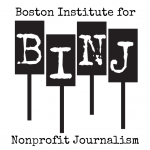A community confronts stigmas hurting immigrants in America
“In that moment, they said give your son your blessings.”
José Oliverio Diaz spoke to audience members at a recent public forum held in Lynn.
With a social worker from the Lynn Community Health Center translating his words into English, he described the experience of emigrating from Guatemala in 2018 and being separated from his child at the border, where the 15-year-old was detained and removed from his family for what would be approximately 60 days.
“I didn’t know why they were asking me to do that,” Diaz said, “so I just hugged him and I said, ‘I don’t know when this is going to end.’”
Diaz was speaking at “Why U.S.? The Immigration Crisis in America.” The public forum, organized by the New Lynn Coalition and Essex County Community Organization, was held at the Lynn Housing Authority and included presentations by professors, activists, community and faith leaders, and Diaz, whose testimony provided a real-life foundation for the conversation.
“We want to demystify the immigration crisis and understand why people are coming to the US,” said NLC organizing director Jonathon Feinberg. “The rhetoric surrounding immigrants needs to be normalized, people need to hear their stories.”
The New Lynn Coalition, formed in 2011, is an alliance of 13 labor and community organizations that works to empower and support working-class families of all races, ethnicities, and economic standings in the region. The federation serves Lynn and the surrounding areas in countless ways but focuses its efforts on fighting for inclusionary zone ordinances, funding for adequate job training, and diversity in municipal housing.
The NLC hosts regular events and actions, and had notable success with the passing of Lynn’s anti-foreclosure ordinance in 2013, as well as with the completed construction of Gateway North, a union-built, mixed-income housing development, in the summer of 2018. The coalition’s most recent project, “Why U.S.?,” was organized to dispel stigmas held about immigration and challenge anti-immigrant sentiments, from the mainstream media to public policy. Lynn is a majority-minority city with a large immigrant population—according to 2018 census data, 34.7 percent of the city’s residents were born outside of the United States.
The emerging sentiment at the forum: There is a disconnect between Lynn residents and city leadership. While the community is home to more than 60 languages and cultures, and has various organizations and outreach programs to support and empower its diverse population, according to Feinberg, Lynn struggles more with “less overt, more systematic racism.” As an example, some activists note long waiting lists for ESL classes and a lack of low-income and affordable housing options.
“We don’t have that representation at all, not in city hall, not with our elected officials,” Maria Carrasco, chair of the New Lynn Coalition, said before the forum began. “You don’t see the balance. … Latinos make up around 35 percent of the population, we should hold at least some power in the city.”
Carrasco also explained that, since she came to the US from the Dominican Republic in 1982, she has seen many of the resources that were at one time available to her and other immigrants disappear.
“When I came here I felt welcome, but if you don’t have those resources, how do you welcome somebody? How do you make them feel at home and respected here?”
Organizers of the NLC forum sought to answer such questions and to educate Lynn residents while fostering respectful and supportive relationships between all residents. To that end, panelists addressed specific topics, with each speaker tapping their own expertise to shed light on the plight of immigrants.
Timothy Seiber, an activist and professor of cultural anthropology at UMass Boston, addressed the myth of immigrant criminology. His detailed presentation focused on youth crime and called into question certain assumptions that President Donald Trump has about immigrants, specifically those from Mexico.
“Why blame immigrants, and especially immigrant youth, for being criminals when overall crime rates are now historically low, when we don’t have a crime crisis, and when immigrants actually make our communities much safer?” Seiber asked. “I suggest that it has a lot to do with scapegoating.”
Author, activist, and Salem State University professor Aviva Chomsky also spoke about such scapegoating, specifically in relation to the loss of American jobs.
“In order to talk about immigrants and jobs, we also have to talk about race,” Chomsky said. “We also have to talk about colonialism.”
In a conversation with the Dig after the forum, Chomsky added, “A lot of the anti-immigrant sentiment comes from a very deep misunderstanding of US history and the country’s role in the world. In order to think about how we can make our system more just, we have to understand what the system actually is.”
Angel Tito Meza, a Honduran activist and member of the Honduran Project, called the system out in his turn.
“What I know about Honduras, what I know about El Salvador, what I know about Venezuela, is that the people really want to change things for the better,” Meza explained. “But the government of the United States and multinational corporations are there because they don’t want these countries to develop their own economies.”
Other speakers included Lynn pastor and community activist Eduardo Cáceres, whose presentation on land theft, drugs, and youth displacement, translated by an interpreter, featured a moving description of the hardships that Guatemalan people face along with reasons some families leave homes for America. Cáceres is originally from San Marcos, Guatemala, and spoke about native farmers in his native region.
“It is like an art, the way that they work,” Cáceres said. “These people paint the mountains with their hands. What I see in those people is the effort to do the same hard work they do in their country and do it here.”
The San Marcos area has been dually devastated by natural disasters and institutionalized corruption, giving many Guatemalans no choice but to leave the country in search of stability and security.
“[America] is hope for these people,” Cáceres added. “They have a very high risk getting here, but that risk is worth their whole life.”
“Now more than ever, we have to be prepared to educate everyone,” Fabiola Alvarez, an NLC intern, said. “If one misinformed person gets the message, that is a mission accomplished. ”










